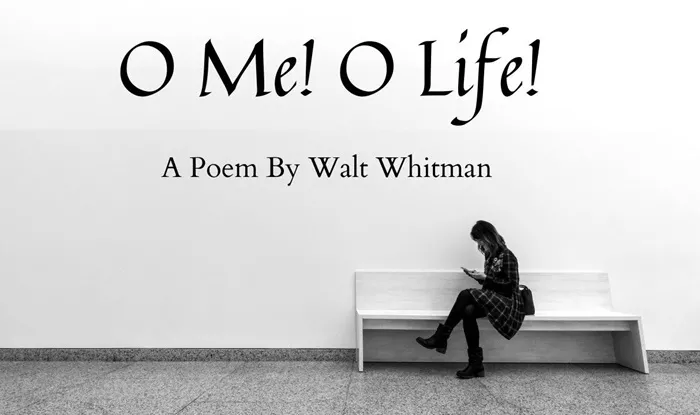Welcome to Poem of the Day – O Me! O Life! by Walt Whitman.
Walt Whitman, one of the most influential American poets, often explored themes of individualism, humanity, and the meaning of life. Among his many notable works, O Me! O Life! stands as a poignant reflection on existence, purpose, and the struggles of the human experience. This article will provide a clear and logical explanation of the poem, breaking down its meaning, themes, and significance.
O Me! O Life! Poem
O me! O life! of the questions of these recurring,
Of the endless trains of the faithless, of cities filled with the foolish,
Of myself forever reproaching myself, (for who more foolish than I, and who more faithless?)
Of eyes that vainly crave the light, of the objects mean, of the struggle ever renewed,
Of the poor results of all, of the plodding and sordid crowds I see around me,
Of the empty and useless years of the rest, with the rest me intertwined,
The question, O me! so sad, recurring—What good amid these, O me, O life?
Answer.
That you are here—that life exists and identity,
That the powerful play goes on, and you may contribute a verse.
O Me! O Life! Explanation
Theme of Despair and Self-Doubt
The poem begins with a series of questions, where the speaker is overwhelmed by the seemingly endless struggles of life. Whitman paints a picture of a world filled with “faithless” individuals, “foolish” cities, and a sense of personal failure. The speaker wonders what the point of it all is, and questions their own role in the vastness of life.
The lines “Of myself forever reproaching myself, (for who more foolish than I, and who more faithless?)” express a deep inner turmoil. The speaker is grappling with self-doubt and a sense of failure, asking, in essence, what value there is in their own existence. The image of eyes “vainly craving the light” symbolizes the yearning for clarity, purpose, and meaning that is never fully satisfied.
The Struggles of Life
Whitman is known for his attention to the struggles of life, and this poem is no exception. The “endless trains of the faithless” and “plodding and sordid crowds” evoke a feeling of monotony, where people go about their daily routines, lost in a world that often seems pointless. The “poor results of all” and “empty and useless years” reflect the existential question that many people face: What is the point of it all? Why do we continue when everything feels futile?
Despite the speaker’s heavy sense of despair, these lines also mirror the universal feelings of doubt and struggle that everyone experiences at some point. Whitman, through the speaker, is not only voicing a personal crisis, but also capturing the human condition.
The Answer: The Power of Life
In the second part of the poem, there is a dramatic shift. After posing the question of life’s meaning, Whitman offers an answer in the form of a profound realization: “That you are here—that life exists and identity, / That the powerful play goes on, and you may contribute a verse.”
This answer is a reminder of the inherent value of life itself. While the world may seem overwhelming and chaotic, the very fact that the speaker exists—“that you are here”—is in itself a significant and meaningful truth. Whitman emphasizes that life, with all its trials and disappointments, is a “powerful play,” suggesting that there is a larger narrative in motion, one in which each individual plays a role.
The phrase “you may contribute a verse” speaks to the idea of agency and contribution. Even in a world that may feel indifferent or unkind, each person has the opportunity to leave their mark, to add something unique and valuable to the unfolding story of life.
The Call to Action
The final lines of the poem convey a message of hope and personal responsibility. Whitman is not dismissing the suffering and confusion that the speaker feels, but he is urging the reader to recognize the importance of their own existence and to actively engage with life. Life, despite its flaws and challenges, is something worth contributing to. Each person’s “verse” is essential to the ongoing “play” of the world.
Conclusion
O Me! O Life! is a profound exploration of the human condition, balancing despair with a call for individual purpose. Whitman begins by depicting the struggles and frustrations of life, only to remind us that existence itself holds value. The poem encourages us to recognize that, even in a world that often feels senseless, we have the power to contribute, to shape the narrative, and to make our existence meaningful. Whitman’s words are a powerful reminder that despite the difficulties we face, life—through its challenges and triumphs—goes on, and we are all part of it.
This exploration of Whitman’s O Me! O Life! ultimately serves as a reflection on the importance of finding meaning in our own lives, and realizing that, despite the seeming futility of things, each of us can add something meaningful to the world around us.

